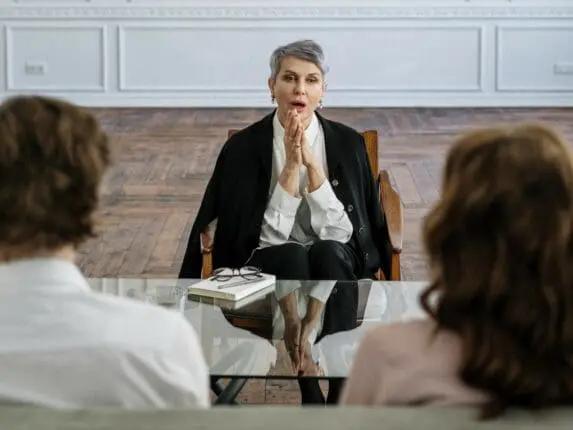Quandary: I’ve been seeing Mark and his wife, Nicole, for couples therapy for almost six months. Mark recently requested an individual session, during which he revealed he’s been chatting online with an old girlfriend and even met her for once drinks when Nicole was away on a work trip, at which point they’d shared a kiss. He says he’s still committed to doing couples work, regrets the kiss but not the rekindled friendship, and has asked me to keep the whole thing a secret. What should I do?
1) Establish Boundaries
I believe Mark’s therapist got himself into this situation by not establishing the limits of confidentiality early on in therapy.
We need to explain to couples right from the beginning that when either partner wants to set up an individual session, it will need to be discussed in a joint session beforehand, so everyone knows it’s happening and has an opportunity to discuss their feelings about the request. We need to be especially clear in saying that we, as therapists, can’t be expected to keep secrets from partners—ever.
I tell clients that they can share thoughts and feelings with me that I’ll keep to myself, but I also warn that I’ll push hard to get them to share this information with their partner. I explain that if they have something they’re afraid to tell their partner, they can ask for my help doing this. Holding me hostage with secrets and betrayals is a completely different matter.
I think Mark likely knows his therapist can’t keep this secret. I believe he’s either—consciously or unconsciously—trying to sabotage therapy through triangulation or asking for help in talking to Nicole about a part of him that’s searching for love outside the relationship instead of in it. Affairs, imagined or otherwise, hold key information about missing elements in a relationship. It requires a painful level of maturity to discuss this within a partnership, but it’s the only way to real relating.
Karen Smith, MSS, LCSW
Philadelphia, PA
2) Don’t Lose Mark
If I was Mark’s therapist, I’d assure him that I’d keep the information he’s told me confidential, so he feels safe sharing anything with me in the future. I’d also want to schedule additional one-on-one sessions with Mark to further explore his initial intentions and plans. If he regrets the kiss but not the friendship, as he says, is he still communicating with his old girlfriend? If so, I’d explore his motivation for doing so and his perceived need to keep this a secret from Nicole. I’d ask what he hopes to gain from a secret friendship and explore his fears around what might happen if Nicole was to learn about all this. Throughout, I’d make sure Mark knows I’m keeping this information confidential, but remind him that it’s entirely possible Nicole might learn about his old girlfriend another way.
Cheryl Chiarello, MS, LPC, NCC
Bridgeton, NJ
3) Assess How Damaging the Secret Could Be
Couples therapy can get very messy if we find ourselves dealing with both the couple’s issues as a unit and the separate issues of each partner in the relationship. I believe it’s important to establish from the very first session what will happen if this scenario occurs. I recognize the importance of providing a safe place for clients and know that many times in joint sessions, partners don’t feel like they can disclose information they might otherwise in an individual session. For this reason, I tell the couples that if an individual session is requested and I’m asked to keep a secret, I’ll want to discuss with the partner why this information should remain a secret.
If I believe keeping the secret will put the other partner at risk, then the first partner and I discuss how and when it will be disclosed. However, I also acknowledge that there may be times when revealing the secret would deal substantial damage to the relationship, in which case the first partner and I will discuss reasons for not disclosing. For example, revealing a years-old secret might not have any value to therapy in the current day, but could damage the future health of the relationship.
That said, if I was Mark’s therapist, I’d strongly encourage him to tell Nicole about the kiss since he sees no problem with the rekindled relationship, has already acted on his desires, and fully intends to stay in contact with his old girlfriend. Keeping this secret poses a risk to his relationship and Nicole’s well-being. I’d tell Mark I can’t keep this secret and explain why. Then, I’d schedule an individual session with Mark to focus on how his thoughts and behaviors are getting in the way of him developing a healthy relationship with Nicole. His selfishness, impulsivity, lack of empathy, and self-sabotage are all things we could explore in therapy.
Katherine Knott, MS, APC, NCC
Duluth, GA
4) “The Couple Is the Client”
I always start my couples therapy sessions by expressing my view that “the couple is the client,” so I don’t wind up keeping any individual secrets. It’s a policy I also have written in my disclosure agreement.
If I was Mark’s therapist, I’d start by reminding him of this rule, telling him that because of it, I can’t promise to keep what he tells me from Nicole, which would give him the opportunity to keep more information about what happened with the old girlfriend to himself. If he decides he wants to talk about it further anyway, I’d ask how he’d feel or react if Nicole was in his situation. Would he want me to keep his wife’s secret and proceed with couples therapy as if I didn’t know about it? How would he expect to build trust in their relationship and set goals together if he’s not only deceiving Nicole, but himself, too?
Next, I’d suggest that we schedule a joint session where Mark can reveal to Nicole what he’s told me. From there, we can process Nicole’s reaction and decide what direction they want to take. I’d also tell Mark that if he’s truly committed to making his relationship with Nicole work, then he needs to end his friendship with his old girlfriend. If he can’t do this, then our therapy together needs to end. Ultimately, I’d suggest that Mark consider seeing an individual therapist if he’s having conflicting feeling about his marriage, Nicole, and his old girlfriend.
Jan Canniff, LMHC
Friday Harbor, WA
5) Explore Possible Motives
My first reaction to Mark’s confession would be one of concern, given that he and Nicole are trying to work on their relationship—and I’d express that to him directly. Next, I’d ask Mark why he decided to tell me this, perhaps saying something like, “Tell me, Mark, how does this fit into the work you and Nicole are doing right now?” I might find out from him that he’s not really as dedicated to working on the relationship in therapy as Nicole is, and that this business with his old girlfriend is his way of acting out. Maybe Mark doesn’t feel fully heard in our sessions. Or he could be trying to gain some sort of power over Nicole by joining with the therapist in his secret.
In any scenario, regardless of what occurred between Mark and his old girlfriend, I’d maintain that Mark needs to come clean with Nicole. Or, if Mark wants out of the relationship, I’d encourage him to at least be honest about it. It would seem like an ethical breach for Mark and me to be holding individual sessions about his activities alongside couples sessions where we can’t discuss Mark’s reality.
Bonnie Haines-Ferrero, LSW
Philadelphia, PA
***
Photo by cottonbro studio/Pexels
Psychotherapy Networker
The editorial staff of Psychotherapy Networker comprises clinicians, journalists, and writers with a passion for creating a community where therapists gather and grow. Learn more on our About Us page.













